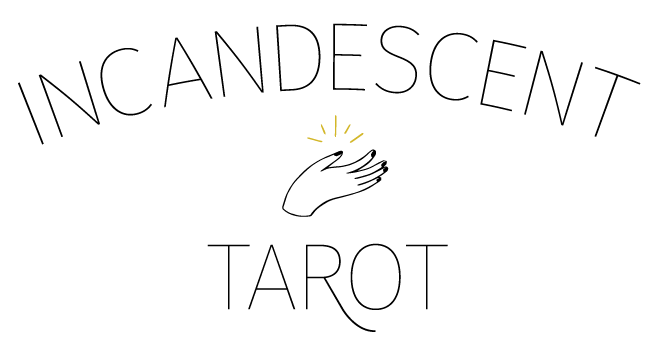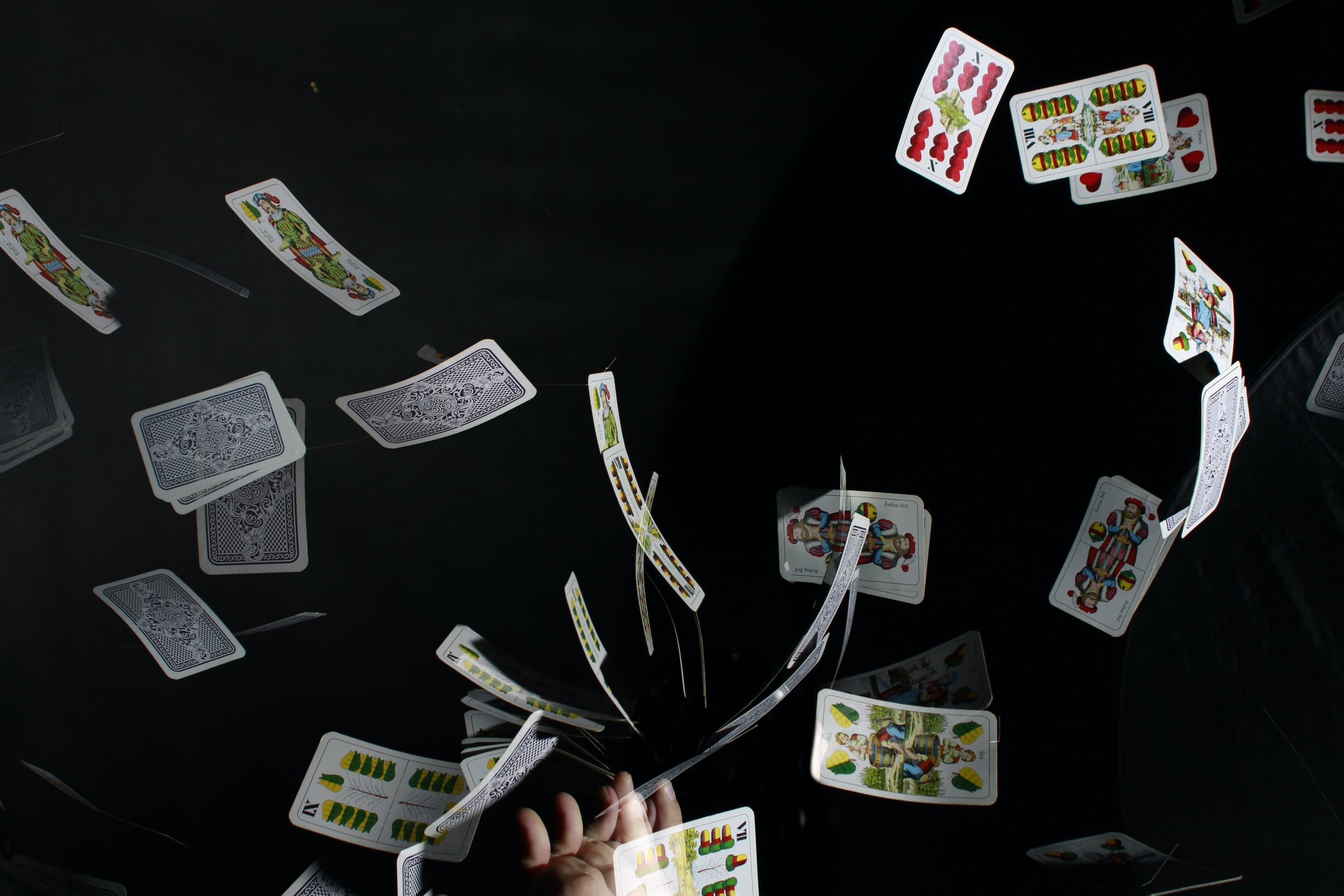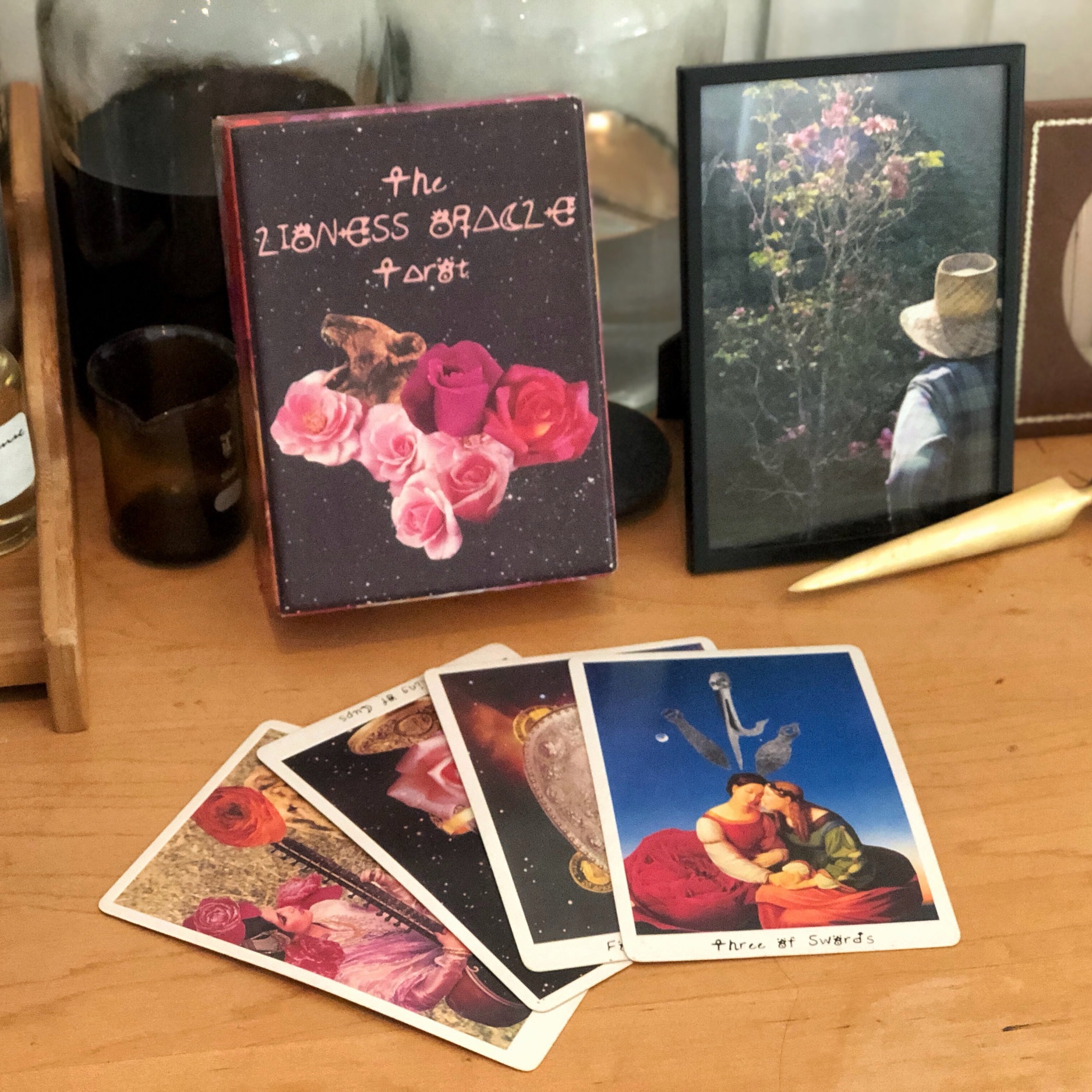3 Things I've Learned as a Spiritual Professional
I got a wonderful question on my Instagram announcement about phasing out of reading tarot full-time at Incandescent Tarot:
What advice do you have for people stepping into this role?
I got a wonderful question on my Instagram announcement about phasing out of reading tarot full-time at Incandescent Tarot:
What advice do you have for people stepping into this role?
When I think about all I’ve learned during my 3 year tenure as a professional tarot reader it’s difficult to distill it into concrete advice. My first thoughts careen through so many categories: spiritual components, business strategies, ethics and boundaries, and more. I’ll likely touch on some of these later, but for now I’d like to focus on the major lessons I’ve learned and approaches that have helped me:
Stand by your Style
Each person reads tarot, does reiki, or teaches meditation differently. When I started out I spend so much time researching the current “pro-tarot scene” that I lost sight of my unique approach. The more time I spent interacting with different readers’ business approaches and tarot philosophies the easier it was to unconsciously adopt their attitudes. This led to a lot of needless tension! Plus, it was almost comical how resoundingly successful I was when I embraced my true voice vs. how awkward and stilted things came out when I tried to be a calm, “enlightened” style reader with a soothing whisper voice. (Definitely not my natural way of being!)
I found that the more time I spent “researching” (aka comparing and drowning out my creative voice with other information) the more muddled and confused my marketing became. In a sense, I spent a lot of time running away from my authentic voice as a tarot reader and, delightfully, my voice won by a landslide.
So, to sum it up here, my advice is: Trust your abilities and work as your true self.
Be Professional!
Lest you think my advice to be yourself includes wearing your sweatpants to appointments! Truly, being professional from the beginning has been one of my best decisions as a spiritual business owner. Well, actually, as a business owner period.
Having your ducks in a row - that means terms & conditions policies, a code of ethics, local permits, cancellation policies, ironclad boundaries, and much more - is one of the best things you can do for your business. I’ve found that having all this ready from the get-go has done so much to ensure that I’m ready for whatever happens AND that I attract clients that are a good fit and know what’s expected when they work with me.
There’s a lot of misinformation and, sadly, disrespect for spiritual businesses that can sometimes lead to difficult situations. I’ve been fortunate enough to avoid most of the sticky situations I’ve heard about, in most part because I feel I’ve set up all the infrastructure to make sure people know what they’re getting and that they’re interacting with a legit professional.
Have Beautiful, Clear Boundaries
Ah, boundaries, how I love you!
This is somewhat of an offshoot of professionalism, but one that’s particularly important in any healing modality. When doing spiritual work you’re entering into a deep and often vulnerable relationship with your clients. A lot can come up in this space, and it’s your job as a professional to hold it for whomever is choosing to work with you. It’s a huge honor to do this work, and stepping outside your boundaries as a professional is a huge breach of that trust.
Where I think this gets tricky is that often people doing this work are extremely empathetic with a strong desire to help. Having a strong sense of self - knowing the boundary between where you end and another complex, sovereign being begins - is absolutely essential. This means having a healthy detachment from your client’s emotions, problems, and reactions. They belong to them alone and it’s not your job to fix or interject with unwanted advice.
Caring for yourself and your mental health is a great way to bolster your boundaries. Have an identity and life outside of your practice! Make time to be a weird, wiggly human being so that you can bring your clearest self to your time with clients.
All sorts of ethics come up here, which is why I think it’s key for each practitioner to spend time really thinking about what they will or will not do, how they approach their sessions, and how they’ll enact their boundaries in real life. For me, this means keeping our interaction within the bounds of our session together, respecting my client’s free will, and not giving prescriptive answers or solutions to problems, no matter how much they may want them.
I’ve written so much here, but there’s still a lot left unsaid!
Let me know if you’d like to hear more about the business side of the equation and, as I continue to process and navigate my gradual shift towards a more muggle profession, I’ll keep you updated on what insights and observations arise. And, as always, thank you for following along on this journey - I’m so grateful to have you here.
Check it Out: Robert Place on Tarot as a Spiritual Path
I’ve been thinking a lot lately about tarot and its many uses, particularly how to sum up my personal approach. As a tarot reader and teacher, I get asked this question a lot. And, as a spiritual seeker, my experience and outlook changes subtly over time.
One of the major shifts has been around the idea of spirituality. As a cynical child from a very secular family, I has an almost allergic response to the term. To me, spirituality meant flighty, irrational, and hopelessly outdated.
I’ve been thinking a lot lately about tarot and its many uses, particularly how to sum up my personal approach. As a tarot reader and teacher, I get asked this question a lot. And, as a spiritual seeker, my experience and outlook changes subtly over time.
One of the major shifts has been around the idea of spirituality. As a cynical child from a very secular family, I has an almost allergic response to the term. To me, spirituality meant flighty, irrational, and hopelessly outdated.
As any of you who’ve been following my work likely know, I was living a huge contradiction: My orientation towards the world, at least privately, was deeply spiritual. I saw the world as a living place, practiced free-form rituals as a young child, and even though I’d never admit it, found deep insight in the tarot.
Perhaps because I didn’t grow up in a religious tradition, I was unaware of the natural, human pursuit of spiritual meaning. To have other people to talk to about these questions and experiences would be delightful! But like any isolated and underexposed child, I thought I was completely alone.
So imagine my surprise when I learned more about what spirituality actually is and found I was already doing it, loving it, and finditing it deeply meaningful!
Which brings us to this article I’d like to share. I shouldn’t be surprised that Robert Place would be the person to so perfectly articulate tarot’s connection to spiritual practice. A renowned and wonderfully reliable scholar of tarot and divination, Place distills these ideas expertly in this interview with Buddha Weekly. He touches on the differences between divination and fortune telling (a key point!) and how to use tarot as a spiritual path.
I particularly love this quote:
“It is better to ask about relationships with other people or about routine decisions that need to be made. You want the Tarot to tell you things that may be hard to hear, about how you are being self-centered or short sighted. And then you want the Higher Self to show you a better way to behave. As you practice this day-to-day and act on the advice, you are making better decisions and becoming more like your Higher Self. This process becomes a spiritual path.”
Check out the interview here and share your thoughts in the comments below. How do you view tarot’s connection with spiritual practice? What has your personal experience been?
Can I Be Rational and Get a Tarot Reading?
You may be surprised with how many clients I get who feel nervous around tarot because they consider themselves skeptic, highly rational, and intellectual. It's a common fear that as soon as we dip our toes into the woo-sphere we're somehow going to have our "rational human being" card revoked. Believe it or not, I can personally relate to this feeling.
You may be surprised with how many clients I get who feel nervous around tarot because they consider themselves skeptic, highly rational, and intellectual. It's a common fear that as soon as we dip our toes into the woo-sphere we're somehow going to have our "rational human being" card revoked. Believe it or not, I can personally relate to this feeling.
I began reading tarot as a young and tender teenager. I had always been drawn to the spiritual, but after that experience began clashing with the very secular and intellectual world around me, I found myself reflexively scoffing at any and all things woo and mystical. In my mind, the two simply couldn't co-exist. Luckily, I've not only found that they can live together harmoniously, but that they're highly compatible as well.
One of the most healing, beautiful, and fascinating aspects of reading for others professionally is seeing people who have some of the same blocks around intellectualism and spirituality engage with the cards. Despite its occult background and evocative symbolism, tarot is, at its root, a remarkably effective tool for discovering and identifying patterns active in our lives. AKA tasks that are highly suited for rational problem solvers.
I'm always so energized by clients who come in looking wary and anxiously at the cards. Once they realize that I don't require all new clients to sign a form declaring their undying belief in astral projection, fairies, and past lives, they start to relax. Many of them want to know the ins-and-outs of the system. How does it all work? Once they have a general feel for it, they often dive into the cards with zeal and uniquely piercing insight.
So often we place rigid boundaries around facets of ourselves that dont' do anyone or anything justice. Who says you can't be intellectual and spiritual at the same time? Who says we can't bring our seeking, discerning, and questioning selves to the table when we get a reading?
In fact, as I've discovered, tarot is a system where the spiritual and intellectual combine to an amazing effect. Of course, we don't even have to adhere to or resonate with any concept of "spirituality," but simply by engaging with the subjective world of the cards we open up our rigid definitions of thinking and problem-solving to richer input and fruitful exploration.
So, to answer the question I posed in the title, yes, you can absolutely be rational and get a tarot reading or read tarot for yourself. Explore the cards and see how they open up new thoughts, insights, and realizations. Call on that pattern-seeking skill you're so adept at to look at your life from a wider vantage point. You'll be surprised at how much you can discover.
Feeling Tender around Spiritual Topics
I was sitting at a cafe the other day and found myself observing an unintentional social experiment. Across from me was a shelf of free books that people could take and read while at the shop. Amongst the books, many of which were by John Gresham, was a happy-looking, yellow volume on Astrology. As people stood by the counter waiting for their coffee they'd pick up one of the books for a quick browse. By far, the most popular was the book on astrology.
I was sitting at a cafe the other day and found myself observing an unintentional social experiment. Across from me was a shelf of free books that people could take and read while at the shop. Amongst the books, many of which were by John Gresham, was a happy-looking, yellow volume on Astrology. As people stood by the counter waiting for their coffee they'd pick up one of the books for a quick browse. By far, the most popular was the book on astrology.
Each time I looked up I saw a different man pick up the book. One even brought it to the table to give it a quick perusal. All of them had a sheepish, furtive look to them, as if they were loathe to be seen in public appearing interested in astrology. As soon as they saw me looking, they put it away.
I see a similar phenomenon when I read tarot at larger public events. People will walk by my table, looking over at me shyly. A lot of people feel nervous when approaching anything that could be percieved as "woo woo" or esoteric. It's understandable and I've been there before. We're swimming in a society that values the rational above all else. Expressing interest in something that's not 100% cut-and-dry makes us feel open to ridicule.
And yet we're still interested. We feel drawn to pick up a book even if we'll put it down quickly if someone notices. Or to read our horoscopes, even seek out a tarot reading. I can't tell you how many times I've been offering readings in public to have someone sit down before me and immediately proclaim, "I don't believe in this." I always have to laugh to myself (internally and subtly, of course) because despite this loud proclamation of disbelieve, there they are, sitting across from a tarot reader, cash in hand.
All this makes me think of the poster behind Agent Mulder's desk in the X-Files that reads, "I Want to Believe." As we can all vouch for, life is a strange, delightful, and confusing experience. We all have personal knowledge of its mysterious nature, things that tell us not all meaning lives on the surface of our lives. There's things we don't know, dreams and mysteries to explore.
Unfortunately, there aren't as many avenues to express the joyous and confounding mysteries of life. And I think we miss it. We miss ways to tap into what we don't know, to engage with our love of symbols, stories, and signs. So I can't begrudge anyone their nervousness and justificaitons around esoteric practices like tarot and astrology. I've been there myself - despite being a deeply spiritual person in practice and belief, I found myself broadcasting a hyper-rational and intellectual persona because I felt vulnerable appearing spiritual.
Sometimes the word "spiritual" can feel so general it's overwhelming. "If I read tarot does that mean I believe in spirit guides/reincarnation/ghosts etc.?" Again, I think that because we've neglected this important part of humanity in our current society, all these beliefs have been unfortunately lumped under one big, broad term. To answer clearly, no. Reading tarot doesn't require any adherence to a school of thought, religion, or dogma. That's why I love it so much. Sure, it combines well with all of the above, but at it's purest, tarot is simply a tool with which we can explore what's not immediately visible to us.
So I have a great deal of empathy for anyone feeling anxious about dipping their toes into the "woo pool." No, getting a tarot reader doesn't make you anything other than a person curious about examining their life creatively and, if you're comfortable with the term, spiritually. I welcome anyone to my tarot table, wherever they're at in their journey. Tenderness and all.


















